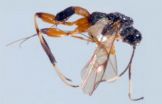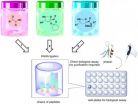(Press-News.org) Nearly half of older adults – 18 million people—have difficulty or get help with daily activities, according to a new study.
Researchers from the University of Michigan and the Urban Institute analyzed data from a national sample of older adults drawn from Medicare enrollment files. In all, 8,245 people were included in the 2011 the National Health and Aging Trends Study. The analysis was published in the current (September 2014) issue of the Milbank Memorial Quarterly.
"Although 51 percent reported having no difficulty in the previous month, 29 percent reported receiving help with taking care of themselves or their households or getting around," said U-M researcher Vicki Freedman, co-author of the report with the Urban Institute's Brenda Spillman. "And another 20 percent said they had difficulty carrying out these activities on their own."
Among those receiving help, one in four lived in either a supportive care setting (15 percent) or a nursing home (10 percent).
Severe disability is more common among those with low incomes, the researchers found. A disproportionate share of low-income persons received assistance with three or more self-care or mobility activities in settings other than nursing homes.
Nearly all older adults had at least one potential informal care network member – family or household member, or close friend – and the average network size was four people.
Older adults who lived in the community reported receiving an average of 164 hours of care a month from informal caregivers – more than five hours a day, on average. Older adults living in supportive care settings reported nearly 50 hours of informal care per month.
About 70 percent of those getting help received assistance from family, friends, and other unpaid caregivers, while about 30 percent received paid care.
Unmet needs, especially among those receiving paid assistance, were sizable, according to the authors. "Among the 18 million who had difficulty or received help, 30 percent had an adverse consequence in the last month related to unmet need," said Spillman. "Among community residents with a paid caregiver, the figure was nearly 60 percent."
Given these substantial care needs, especially among those with few economic resources, the authors conclude that policies to improve long-term care services and supports, and reduce unmet needs could benefit both older adults and those who care for them.
INFORMATION:
The research was funded by the Department of Health and Human Services and the
National Institute on Aging.
To obtain a copy of the research report, visit http://www.milbank.org and go to The Milbank Quarterly.
Established in 1949, the University of Michigan Institute for Social Research (ISR) is the world's largest academic social science survey and research organization, and a world leader in developing and applying social science methodology, and educating researchers and students from around the world. For more information, visit the ISR Web site at http://home.isr.umich.edu
Nearly half of older adults have care needs
2014-09-08
ELSE PRESS RELEASES FROM THIS DATE:
The future of our crops is at risk in conflict zones, say Birmingham scientists
2014-09-08
Wild species related to our crops which are crucial as potential future food resources have been identified by University of Birmingham scientists, however, a significant proportion are found in conflict zones in the Middle East, where their conservation is increasingly comprised.
The scientists have identified 'hotspots' around the globe where crop wild relatives (CWR) – species closely related to our crops which are needed for future crop variety development – could be conserved in the wild in order to secure future global food resources.
The hotspot where CWR ...
New parasitoid wasp species found in China
2014-09-08
For the first time, wasps in the genus Spasskia (family: Braconidae) have been found in China, according to an article in the open-access Journal of Insect Science. In addition, a species in that genus which is totally new to science was also discovered.
The new species, Spasskia brevicarinata, is very small — male and female adults are less than one centimeter long. It is similar to a previously described species called Spasskia indica, but the ridges on some of its body segments are different. In fact, the species epithet brevicarinata reflects a short ridge on its ...
Unusual immune cell needed to prevent oral thrush, Pitt researchers find
2014-09-08
PITTSBURGH, Sept. 8 – An unusual kind of immune cell in the tongue appears to play a pivotal role in the prevention of thrush, according to the researchers at the University of Pittsburgh School of Medicine who discovered them. The findings, published online today in the Journal of Experimental Medicine, might shed light on why people infected with HIV or who have other immune system impairments are more susceptible to the oral yeast infection.
Oral thrush is caused by an overgrowth of a normally present fungus called Candida albicans, which leads to painful white lesions ...
'Pick 'n' Mix' chemistry to grow cultures of bioactive molecules
2014-09-08
Chemists at ETH-Zürich and ITbM, Nagoya University have developed a new method to build large libraries of bioactive molecules – which can be used directly for biological assays – by simply mixing a small number of building blocks in water.
Zürich, Switzerland and Nagoya, Japan – Professor Jeffrey Bode of ETH-Zürich and the Institute of Transformative Bio-Molecules (ITbM) of Nagoya University, and his co-worker have established a new strategy called "synthetic fermentation" to rapidly synthesize a large number of bioactive molecules, which can be directly screened in ...
Trial shows improved overall survival for patients with liver cancer not amenable to surgery
2014-09-08
Singapore, 04 September 2014 – The mature results from a trial conducted by the Asia-Pacific Hepatocellular Carcinoma Trials Group led by the National Cancer Centre Singapore (NCCS) and Singapore General Hospital (SGH) have shown that patients who suffer from inoperable advanced hepatocellular carcinoma (HCC) may have a chance to live significantly longer by using a combined therapy.
The multi-centre phase II clinical trial was conducted at four Asia Pacific tertiary medical centres to evaluate the efficacy of combining two existing treatment modalities, Sorafenib and ...
New knowledge of cannabis paves the way for drug development
2014-09-08
Revolutionary nanotechnology method could help improve the development of new medicine and reduce costs. Researchers from the Nano-Science Center and the Department of Chemistry at the University of Copenhagen have developed a new screening method that makes it possible to study cell membrane proteins that bind drugs, such as cannabis and adrenaline, while reducing the consumption of precious samples by a billion times.
About 40% of all medicines used today work through the so-called "G protein-coupled receptors". These receptors react to changes in the cell environment, ...
Study examines discrimination among homeless adults in Toronto with mental illness
2014-09-08
TORONTO, Sept. 8, 2014—Vulnerable populations in ethnically diverse Toronto reported more discrimination by health care workers based on their housing status, mental health or substance abuse issues than race, a new study has found.
Forty-two per cent of people surveyed reported at least one form of perceived discrimination by health care workers, lead author Dr. Vicky Stergiopoulos wrote in a paper published today in the journal BMC Health Services Research.
The most prevalent form of perceived discrimination was due to mental illness or substance abuse (33 per cent) ...
Poor recording of physical health and medication could be causing dementia trials to fail
2014-09-08
Dementia trials could be failing because they all-too-often overlook the physical health of patients – according to new research from the University of East Anglia and Aston University.
More than 60 per cent of people with dementia are estimated to have three or more other conditions (co-morbidities).
The research shows how the combined effects of co-morbidities including diabetes, lung disease, arthritis and chronic heart failure are not being adequately described in dementia trials.
It investigates the extent of co-morbidities in people with dementia and the recording ...
Food craving is stronger, but controllable, for kids
2014-09-08
Children show stronger food craving than adolescents and adults, but they are also able to use a cognitive strategy that reduces craving, according to new research published in Psychological Science, a journal of the Association for Psychological Science.
"These findings are important because they suggest that we may have another tool in our toolbox to combat childhood obesity," says psychological scientist and lead researcher Jennifer A. Silvers, a post-doctoral fellow at Columbia University in the laboratory of Professor Kevin Ochsner.
Most interventions aimed at ...
Quick-cooled beers, perfect burgers and more: Chemistry Life Hacks, Vol. 3 (video)
2014-09-08
WASHINGTON, September 8, 2014 — It's the series that's one-part MacGyver, one-part Mendeleev. "Chemistry Life Hacks" is back with new tips that can change your life, or at least the temperature of your beer. Learn how to cool your brews quickly before the big game starts, get fruit flies out of your kitchen for good, and how to cook the perfect patty on the grill. Check out these tips and more at: http://youtu.be/QUE2O1276P8.
Subscribe to the series at Reactions YouTube, and follow us on Twitter @ACSreactions to be the first to see our latest videos.
INFORMATION:
The ...




